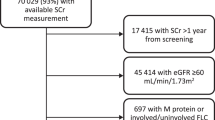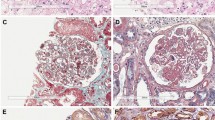Abstract
RECENTLY, we noted that serum from patients with acute pancreatitis has a decreased ability to bind trypsin1,2. Although it is known that this trypsin-binding activity is associated with alpha-2-macroglobulin (α2-M)1,3, the ultracentrifuge pattern of serum proteins of these patients showed no decrease in total macroglobulin. There have been a number of estimates of normal concentrations of α2-M using immunological methods4–6 which are substantially higher than earlier estimates involving complement fixation7 and ultracentrifugation8. Indeed, James et al.6 concluded from immunological determinations that the total macroglobulin was normally more than 5 per cent of total plasma protein, rather than the 2–3 per cent generally reported from ultracentrifuge studies9. Comparison of the values of α2-M in serum determined immunologically with those determined by analytical ultracentrifugation made it necessary to measure gamma-macroglobulin (IgM) by immunoassay because the 19S fraction determined by ultracentrifugation represents both α2-M and IgM. We believe that the lack of purity of the α2-M is the cause of the high values recently reported.
This is a preview of subscription content, access via your institution
Access options
Subscribe to this journal
Receive 51 print issues and online access
$199.00 per year
only $3.90 per issue
Buy this article
- Purchase on Springer Link
- Instant access to full article PDF
Prices may be subject to local taxes which are calculated during checkout
Similar content being viewed by others
References
Haverback, B. J., Dyce, B. J., Bundy, H. F., Wirtschafter, S. K., and Edmondson, H. A., J. Clin. Invest., 41, 972 (1962).
Adham, N. F., Dyce, B. J., Wilding, P., Wong, T., and Haverback, B. J., Clin. Res., 15, 128 (1967).
Steines, W. J., and Mehl, J. W., J. Lab. Clin. Med., 67, 559 (1966).
Hitzig, W. H., in Die plasmaproteine in der klinischen Medizin, 115 (Springer, Berlin, 1963).
Weiss, W. A., Klin. Wochschr., 43, 273 (1965).
James, K., Johnson, G., and Fudenberg, H. H., Clin. Chim. Acta, 14, 207 (1966).
Peterkofsky, A., Levine, L., and Brown, R. K., J. Immunol., 76, 237 (1956).
Wallenius, G., Trautman, R., Kunkel, H. G., and Franklin, E. C., J. Biol. Chem., 225, 253 (1957).
Ericksen, N., J. Lab. Clin. Med., 51, 521 (1958).
Mancini, G., Vaerman, J. P., Carbonara, A. O., and Heremans, J. F., in Protides of the Biological Fluids, Proc. Eleventh Colloquium, Bruges (edit. by Peters, H.), 370 (Elsevier, Amsterdam, 1964).
Howard, S. M., dissert., Univ. Southern California (1966).
Johnston, J. P., and Ogsten, A. G., Trans. Faraday Soc., 42, 789 (1946).
Eahey, J. L., and McKelvey, E. M., J. Immunol., 94, 84 (1965).
Author information
Authors and Affiliations
Rights and permissions
About this article
Cite this article
WILDING, P., ADHAM, N., MEHL, J. et al. Alpha-2-macroglobulin Concentrations in Human Serum. Nature 214, 1226–1227 (1967). https://doi.org/10.1038/2141226a0
Received:
Revised:
Issue Date:
DOI: https://doi.org/10.1038/2141226a0
This article is cited by
-
Serum-Alpha-2-Makro-Globulin-Veränderungen bei Patienten mit Schädelhirntrauma
European Surgery (1977)
-
Serumproteinveränderungen bei Patienten mit Schädel-Hirn-Trauma — Vergleich zwischen α2- und α2M-Globulinabweichungen
Acta Neurochirurgica (1976)
Comments
By submitting a comment you agree to abide by our Terms and Community Guidelines. If you find something abusive or that does not comply with our terms or guidelines please flag it as inappropriate.



